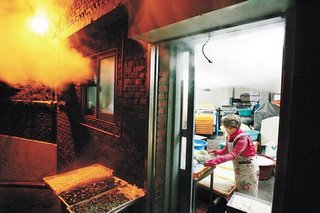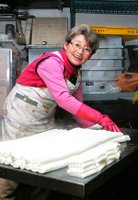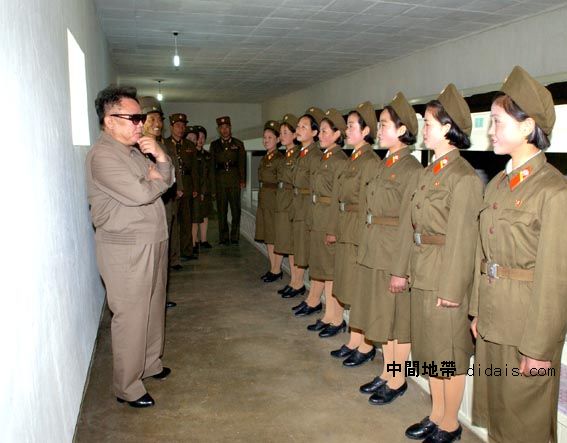passing away of Nam June Paik
Categories at del.icio.us/hunjang: art • culturalhistory |


www.flickr.com
|

|
Categories at del.icio.us/hunjang: art • culturalhistory |
| Just as I had finished writing elsewhere that the absence of the offspring of small shopkeepers in the shops has a lot to do with the fact that the businesses very rarely are thought of as something to be passed on, Chosun Ilbo has in its serial Salmat nanûn sesang ("life worth living" or "good world" or something like that) a feel-good story of a rice mill-bakery (pangakan) kept by a granny in her 60s, who is thinking of handing over the mill to her youngest son. He has not married, and has been helping her mother in the pangakan since he finished his military service. Ok, I'll take this only as an aberration from a general pattern... The article is a prime example of how certain Korean values like goodheartedness and human warmth (or whatever) or chông (jeong情) are associated with a non-modern environment, lack of urban development, and village-like human relations. Granny's rice mill is located in Buam-dong, Jongno-gu, which is behind the presidential mansion right under Bugak mountain. First paragraph: Buam-dong, Jongno-gu in Seoul. In this place called "the village behind the Blue House" everything takes place slowly. In the alleys lined by rice shops, barber shops, and Chinese restaurants the pace of the residents is not hurried, and grandmothers are enjoying the winter sunshine and chatting in front of the grocery store.   Update, Feb 1, 2006 Dram Man has good comments on the choice of the son to be involved in the business; I failed to think of the economical incentives that he points out. In fact, granny's business is apparently good: two thirds of her ttôk is sold to Gangnam people, and the several art galleries in the vicinity are her regulars (reappreciation of traditional ritual food). Categories at del.icio.us/hunjang: businesskeepers • neighborhood • Koreanculture |
 국방위원장께서 중국 갔다오시고 바로 현지지도를 하러 가셨나 보다. 아니 근데, 살이 빠지셨다고 하니, 장군님의 턱을 보니까 옛날 사진일 터. Categories at del.icio.us/hunjang: DPRK |
| When the investigative program PD Such'ôp (Producer's memo) of MBC started broadcasting the results of its inquiries to the case of Dr Hwang Woo-suk, the supporters of Dr Hwang (who at first were quite many) countered the allegations by making and circulating Tongne Such'ôp ("neighborhood memo") parodies (?) in the net. Here the term tongne (neighborhood) is supposed to be a disparaging term, telling that the worth of the original program is at the lowest "neighborhood level". (It is quite clear that tongne isn't applied to PD Such'ôp any more since the role of the program in bringing Hwang's misdeeds into light was reported worldwide.) But it was not only the supporters of Dr Hwang (he still has his doctorate intact, doesn't he?) that used the same term to ridicule the quality of programming concerning the case. A bit more than a week ago a KBS newsprogram Sisajungsim ("concentrating on current events") aired a program which apparently presented all kinds of conspiracy theories around the issue of Hwang as equal to the better established facts. Jin Jung-kwon, the political commentator and adjunct university teacher who nowadays hosts a radio program at SBS, commented in his program that KBS deserves to be renamed DBS (dongnebangsong, "neighborhood broadcast") for airing such nonsense (article in Pressian). This is just a reminder for myself that tongne is not just a cosy term for neighborhoods and the sphere of one's daily activities, implicating a bit more humane relationships, reciprocity (I am an anthro after all), more chông(情) than in other environments; that it does have implications of class and stratification as well. It's not a coincidence that tongne isn't used that much about more well-off apartment neighborhoods. (I was also reminded of this when translating the outline of my thesis to Korean; neighborhood goes well in English, but its closest equivalent in Korean, tongne, is more nuanced. "Neighborhood business" is tongne changsa, but it is also chugô chiyôk sogyumo saôp/chayôngôp. Categories at del.icio.us/hunjang: stratification • Koreansociety • neighborhood • media |
Jack Goody reviews Métamorphoses de la parenté by Maurice Godelier in New Left Review. Us not too familiar with French or other books more urgent than this to read should get a good idea what Godelier's work is about from Goody's review. The first paragraph:
Categories at del.icio.us/hunjang: anthropology • books |
Categories at del.icio.us/hunjang: technicalities • Sillim/Gwanak |
I think it was already before the news of the research fraud by Dr Hwang hit the news, at the time of the biggest hype around his alleged achievements, I passingly thought of the Raelian movement, a bunch which sees humans having been created by aliens and which has been active at least in talk about cloning humans. Had I now been following Korean affairs I may never have gotten aware of the movement, which attracted a lot of attention in Korea at the time of Mr Rael's visit in August 2001.
He was nevertheless denied entry when he was coming to Korea again in 2003. For this outrageous act of religious persecution Mr Rael announced that he was planning of sending the members of his organizations to hold demonstrations in front of ROK embassies and boycott Korean products in case the ROK government did not apologize (Yonhap article via Hankyoreh). Mr Rael also got support in the form of a one-person demonstration in front of the parliament in March 2004 (Hankyoreh) Seems that Mr Rael has now forgiven Koreans, or perhaps he and his organizations are feeling sympathy for Dr Hwang, as we are told that Clonaid, company created by Raelians, is offering Dr Hwang support and even inviting him to work in its cloning laboratory. From Clonaid's news page: Clonaid supports Dr Hwang Oranckay's definitive blog note on the case of Dr Hwang starts by thinking of him as a kind of a spiritual leader of a religious cult, and Raelians offering him a job won't help Dr Hwang to escape this conclusion. Raelians seem to have found someone of their kind. Categories at del.icio.us/hunjang: Koreansociety ∙ Koreanculture |
| Hankyoreh has an apparently important series of articles on the yanggûkhwa... polarization of the society. I don't see yet any special page which links all the articles of the serial, so I'll collect them for the time being here. [2006 연중기획 함께 넘자, 양극화] • 1부 건강불평등 사회 ① 동네따라 수명 다르다: 강북구 사망위험 강남구보다 30% 높다 • 1부 건강불평등 사회 ① 동네따라 수명 다르다: 3인 사례 보면…검진기회도 소득순… 발병 알땐 늦다 • 1부 건강불평등 사회 ① 동네따라 수명 다르다: 먹고사는데 급급... 폐암·간질환 사망 • 1부 건강불평등 사회 ① 동네따라 수명 다르다: 건강차이 개인탓일까… 경제위기 뒤 벌어졌는데... • 1부 건강불평등 사회 ② 부모의 지위는 아이의 건강지수: 저체중아 산모 3명 사례 • 1부 건강불평등 사회 ② 부모의 지위는 아이의 건강지수: 초등학력 산모 저체중아 낳을 확률은 대졸자의 1.8배 • 저체중아 재활치료 정부지원 전혀없어 • 1부 건강불평등 사회 ③ 흡연이 계층을 가른다: 막노동 유씨 ‘줄담배’... 교사 홍씨는 ‘건강 금연’ • 1부 건강불평등 사회 ③ 흡연이 계층을 가른다: 홧김에 한대 고단한 삶에 또 한대... • 1부 건강불평등 사회 ④ 정신건강의 굴레, 비정규직: 반복되는 실업·재취업…건강관리 꿈도 못꿔 • 비정규직, 고용불안·저임금…스트레스에 허우적 • 우울증·신체질환 비율 비정규직 더 높 • • • • • (Continues) A good, very good serial, but Hankyoreh could benchmark for example Chosun Ilbo for creating a special page for an easier access to all the articles in the serial. Categories at del.icio.us/hunjang: stratification • Koreansociety |
I don't have much - or actually anything - to complain after seeing the student evaluations of my last semester's course, but let me still give a note for a new blog called Rate Your Students:The Rate Your Students blog offers college professors a chance to rate their students. We love most of our students, but get annoyed at the entitled members of the iPod generation and their casual relationship to a college education.Ok, let me let off some steam as well. • Not keeping deadlines for assignments. It's not really my fault that I didn't manage to make a menacing impression enough to have the students hand out their assignments in time; it's the lax atmosphere of Finnish universities. I thought of having a minus-point system for each day late, but then in the end I didn't. • Too little response and feedback during the course. I had this course blog, and all I got from students attending the class one one single comment. There was also one by Oranckay, in which he suggested I make the course schedule available in a language more widely recognized than Finnish. • This is not about students, but about having students write assignments during and at the end of the course instead of keeping a one single final exam as I've done earlier. For an hourly paid lecturer (sigan kangsa) the latter is the only reasonable alternative given how much extra toil the former method entails. The meager pay, in which class preparation and grading is not considered, is diluted even more when there's a lot of writing to be read and graded. For the purpose of university education, the former method (assignments, reports) is of course better, but there's a limit how much an hourly paid lecturer should reasonably expect to work for a course. Universities are already... puryô môkko itta, how do you say it, using the work of underpaid non-permanent staff and overworking the permanent staff. (I just refused to give a look at an essay on a Korean subject submitted for the requirements in the program in which I've been teaching; I do classes for which I'm paid, and also welcome students to talk and ask about subjects in which I might be of help, but I won't give help in grading for an institution to which I don't have any formal institutional affiliation besides occasional courses.) Ok, let me emphasize once more that even though not overactive in class or online or not attentive of assignment deadlines (some were!), the students of my class were a nice bunch, attended classes despite of there not being a final exam based on class contents. And one thing still: several students wrote in their assesments that the classes I did with MS Powerpoint (two out of 12) were good. Do the modern-day students need typed text and bright pics projected on a canvas for an interesting class? Even though I recognize the advantages of presentation technology, especially after having seen some very fine guest lectures using text, video, and audio, but I haven't (yet) learned to be so fond of Powerpoint, mainly because I still lack the routine needed not to waste too much time in preparing the presentations. Perhaps some day I'll find the way to prepare a class and transfer it to Powerpoint in a reasonable manner timewise, but that's not yet the case. Categories at del.icio.us/hunjang: academic • blogging |
More reproductions of Mr Ryu's paintings in his son's blog. Ssamzie Gallery is in Insa-dong, subway #3, Anguk station, exit 6, 100 meters down the main street. Categories at del.icio.us/hunjang: art ∙ businesskeepers |
Hankyoreh interview with Mahdi Safari, a representative of the Foreign Ministry of Iran :[...]Hankyoreh, what about telling even a bit of what's been behind the "constant criticism of Western nations", if you don't have the guts to ask whether it's appropriate to call for a destruction of a certain nation? For that, I'll refer those who might want to know to Al Jazeera. Lately Hankyoreh has given a lot to wonder what its actual views are on human rights, application of laws, and democracy in the Korean peninsula. |